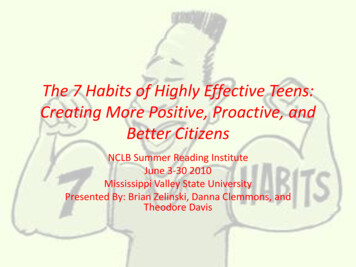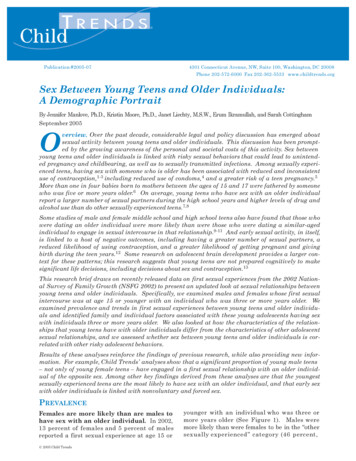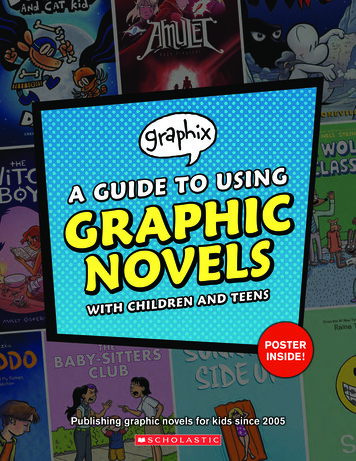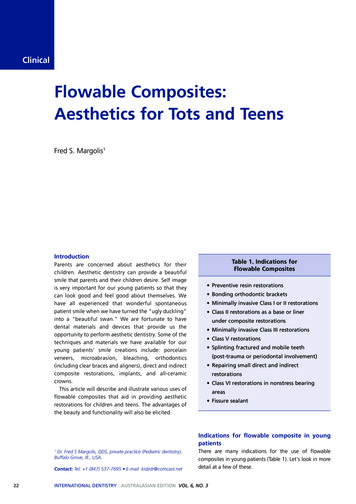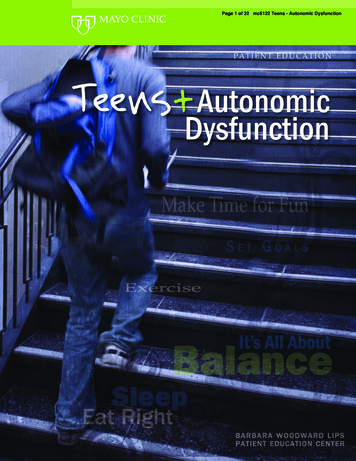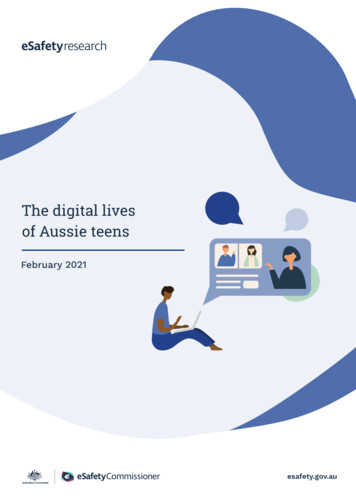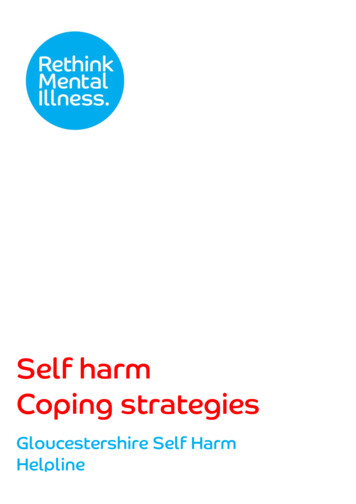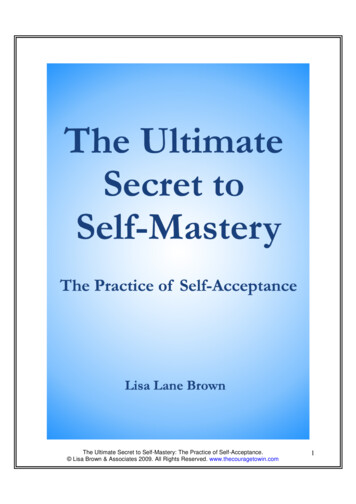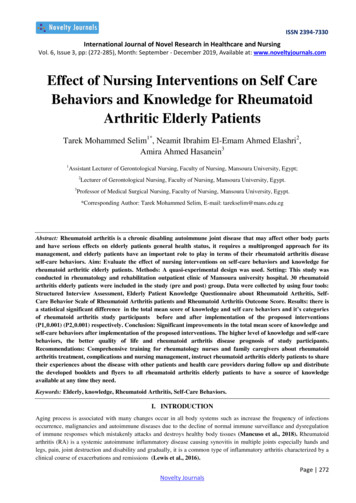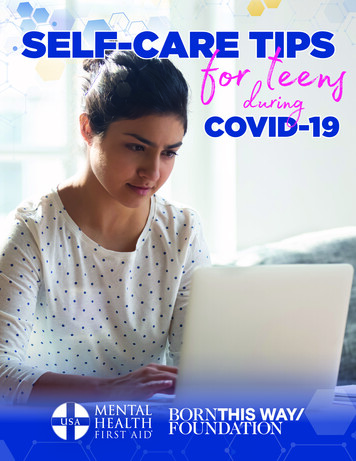
Transcription
SELF-CARE TIPSfor teensCOVID-19
TIPS FOR MENTALHEALTH AND COPING:CO P ETIPS TO HELP TEENSduring COVID-19Self-care is vital to protecting your mental healthand well-being during stressful situations. Weencourage you to take a few minutes during yourday to be the difference for the teens in your lifewith these tips from MHFA. Here are a few waysthey — and you — can care for yourselves.1.MAINTAIN A DAILY ROUTINE with consistentsleep, activity and study patterns.2.STAY CONNECTED with others and try to findmoments of gratitude.3.TALK TO PEOPLE you feel comfortable withabout your feelings or worries, then giveyourself permission to stop worrying.4.EAT BREAKFAST every morning. If possible,maintain a healthy diet with fruits andvegetables and eat meals at regular timesthroughout the day.5.LIMIT COFFEE OR ENERGY DRINKS; theywill increase feelings of anxiety and make itdifficult to relax.6.LOOK FOR PATTERNS or be aware ofsituations that make you feel particularlyworried or anxious. When you’re in thesesituations, try relaxation or distractiontechniques or ask a family member or friendto help.7.RELIEVE TIMES OF HIGH ANXIETY withexercise or physical activity; engage in regularaerobic exercise.8.LIMIT NEWS AND SOCIAL MEDIACONSUMPTION if you are finding informationabout COVID-19 overwhelming or distressing.9.DO HOBBIES OR ACTIVITIES that you enjoy,calm you down or focus your mind and body.These could be arts and crafts, physicalactivity, listening to music, reading, journaling,watching TV or movies, or connecting withfriends (remotely).10.UNDERSTAND that the people aroundyou are probably also finding this situationstressful and they might also be havingdifficulty controlling their emotions. Try toresolve conflict.11.IF YOU CONTINUE to feel overwhelmed,out of control or unable to calm down aftera period of weeks, seek help from a mentalhealth professional.12.BE KIND TO YOURSELF AND OTHERS. We’llwork through this together.
TIPS TO HELP TEENS COPE DURING COVID-19When our world changes quickly and suddenly because of things like COVID-19, it is common to experiencechanges in our thoughts, feelings and behaviors. Feelings of anxiety, fear or worry are typical in stressful situations.TYPICAL REACTIONS INCLUDE: Feeling stressed or overwhelmed, frustrated or angry, worried or anxious Feeling restless, agitated, on ‘high alert’ or unable to calm down Being teary, sad, fatigued or tired, losing interest in usually enjoyable activities or finding it difficult to feelhappy Worrying about going to public spaces, becoming unwell or contracting germs Constantly thinking about the situation, unable to cope or think about much else Experiencing physical symptoms such as increased fatigue or other uncomfortable sensationsEveryone reacts differently to stressful situations, so you should not expect any specific reaction. Still, take a fewmoments to talk with the teens in your life about how they are feeling and what may help them during this difficulttime. Remind them that all of these thoughts and feelings are common right now, and discuss simple self-carestrategies that will help manage symptoms of anxiety and depression. Here are a few tips for mental health andcoping from teen Mental Health First Aid: Maintain a daily routine with consistent sleep, activity and study patterns. Stay connected with others and try to find moments of gratitude. Talk to people you feel comfortable with about your feelings or worries, then give yourself permission tostop worrying. Eat breakfast every morning. If possible, maintain a healthy diet with fruits and vegetables and eat meals atregular times throughout the day. Limit coffee or energy drinks, as these will increase feelings of anxiety and make it difficult to relax. Look for patterns or be aware of situations that make you feel particularly worried or anxious. When you’rein these situations, try relaxation or distraction techniques or ask a family member or friend to help. Relieve times of high anxiety with physical activity; engage in regular aerobic exercise. Limit the amount of time you spend consuming news media or social media if you are finding informationabout COVID-19 overwhelming or distressing. Do hobbies or activities that you enjoy, calm you down or focus your mind and body. These could be artsand crafts, physical activity, listening to music, reading, journaling, watching TV or movies, or connectingwith friends by phone, videoconference or text. Understand that the people around you are probably also finding this situation stressful, and they mightalso be having difficulty controlling their emotions. Try to resolve conflict. If you continue to feel overwhelmed, out of control or unable to calm down after a period of weeks, seekhelp from a mental health professional. Take time for yourself. Be kind to yourself and each other. We’ll work through this together.If feelings do not improve, consider reaching out to a mental health professional or seeking online therapy. With theright information and resources, we can #BeTheDifference for the teens in our lives during and after COVID-19.teen Mental Health First Aid is expanding and will be available to every school in the country in Fall 2020.Learn more at MHFA.org/teens.
SUPPORTING FRIENDS DURING COVID-19It’s hard not to be with your friends at school or on weekends because of physical distancing. However, you canstill stay connected to them while at home with video chats, text messaging, phone calls and social media. You canmaintain your friendships and support each other through this difficult time.While you’re connecting with your friends online or on the phone, it’s important that you look for warning signs thatmay indicate they are really struggling and need help. Pay attention to what they are posting and sharing online.Negative messages, photos, videos, links, comments or hashtags may suggest the person is in emotional distress.If this is the case, reach out to your friend to ask how they are doing and get them connected to a supportive andresponsible adult, if needed.If you or a friend feels overwhelmed with emotions like sadness, depression or anxiety, or like you want to harmyourself or others, call 911 or one of the national crisis resources below.NATIONAL CRISIS RESOURCES National Suicide Prevention Lifeline: Call 1-800-273-TALK (8255) for free 24/7 support. Call 1-888-6289454 for support in Spanish. Crisis Text Line: Text “MHFA” to 741741 for free 24/7 crisis counseling. Lifeline Crisis Chat: Visit www.crisischat.org to talk online with crisis centers around the United States. The Trevor Project: Call 866-488-7386 or text “START” to 678678 for mental health support specialized forthe LGBTQI community. Substance Abuse and Mental Health Services Administration’s (SAMHSA) Disaster Distress Helpline:Call 1-800-985-5990 or text TalkWithUs to 66746 to connect with a trained crisis counselor.ADDITIONAL RESOURCES FOR TEENSThese online resources are free and may help you and your friends cope with stress and manage your mental healthduring these uncertain times. Jed Foundation: Guidance on how to recognize a friend’s emotional distress online and how to get thatfriend help. Help a Friend in Need: A Guide for Facebook and Instagram. TeensHealth: A safe place for teens to access honest and accurate information on mental health issuesincluding specific information about the novel coronavirus (COVID-19) and coping with stress. Coronavirus(COVID-19): How You Can Make a Difference, Stress and Coping Center. National Alliance on Mental Health: Information for teens and young adults about managing mental healthand supporting friends. Teens and Mental Health. Born This Way Foundation: Programs and campaigns for young people to increase access to resources andservices that support their mental health and build communities that make mental and emotional health apriority. Resources to support mental wellness and evidence-based self-care tips.It’s important to stay connected with your friends while practicing physical distancing and provide support howeveryou can. There are fun ways to stay connected using technology and simple self-care strategies you can do athome to help manage your mental health.teen MHFA is expanding and will be available to every school in the country in Fall 2020.Learn more at MHFA.org/teens.
SOCIAL MEDIA INFOGRAPHICSTIPS TO HELP teens COPE DURING COVID-19Maintain a dailyroutine withconsistent sleep,activity and studypatterns.Stay connectedwith others and tryto find momentsof humor.Talk to people youfeel comfortable withabout your feelingsor worries, then giveyourself permission tostop worrying.SUPPORTINGFriends During COVID-191Stay CONNECTED with video chats, text messaging, phonecalls or social media.2Look for WARNING SIGNS that may indicate your friend isreally struggling and needs help. This can include what theyare posting and sharing online.3REACH OUT to your friend and ask how they are doing.Connect them to a supportive adult if they need help.4If you or a friend feels OVERWHELMED with emotionsor like you want to harm yourself or others, textMHFA to 741741 to talk to a Crisis Text Line counselor.Limit the amountof time you spendtalking about orwatching news mediaor social media.Be kind to yourselfand each other.We’ll work throughthis together.
National Suicide Prevention Lifeline: Call 1-800-273-TALK (8255) for free 24/7 support. Call 1-888-628-9454 for support in Spanish. Crisis Text Line: Text “MHFA” to 741741 for free 24/7 crisis counseling. Lifeline Crisis Chat: Visit www.crisischat.org to
